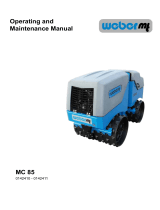
Table of Contents RT SC-2
6 wc_bo0182601en_001TOC.fm
3.21 Operation on Slopes ............................................................................54
3.22 Articulated Joint Locking Bar ...............................................................55
3.23 Tip-Overs .............................................................................................55
3.24 Emergency Shutdown Procedures ......................................................56
3.25 Overview of the ECM and the Diagnostic Tool ....................................56
3.26 ECM Stages of Engine Start Up ..........................................................57
3.27 ECM Monitoring of Solenoids ..............................................................58
3.28 Connecting the Diagnostic Tool ..........................................................59
3.29 ECM Tip-Over Modes ..........................................................................60
3.30 Programming the ECM Tip-Over Mode ...............................................61
3.31 Entering the ECM Diagnostic Mode ....................................................62
3.32 ECM Fault and Error Codes ................................................................63
3.33 Resetting the ECM Diagnostic Data and the Tip-Over Light ...............66
3.34 Calibrating the Joysticks ......................................................................67
4 Maintenance 68
4.1 Transporting Machine ..........................................................................68
4.2 Lifting Machine ....................................................................................68
4.3 Job Site Storage ..................................................................................69
4.4 Storage ................................................................................................70
4.5 New Machines .....................................................................................70
4.6 Periodic Maintenance Schedules ........................................................71
4.7 Hydraulic Oil Requirements .................................................................72
4.8 Hydraulic Oil Level ..............................................................................72
4.9 Changing Hydraulic Oil & Filter ...........................................................73
4.10 Articulated Joint and Steering Cylinders .............................................75
4.11 Cleaning SmartControl™ Transmitter .................................................75
4.12 Drive Gearcase ...................................................................................76
4.13 Exciter Lubrication ...............................................................................77
4.14 Scrapers ..............................................................................................78
4.15 Shockmounts .......................................................................................78
4.16 Changing Drums .................................................................................79
4.17 Battery .................................................................................................80
4.18 Engine Oil System ...............................................................................81
4.19 Engine Oil and Filter ............................................................................82
4.20 Air Cleaner ..........................................................................................83
4.21 Engine Fuel Delivery System Maintenance .........................................84
4.22 Changing the Fuel Filter ......................................................................84
4.23 Draining the Fuel Filter Water Separator .............................................85
4.24 Priming the Fuel System .....................................................................85





















